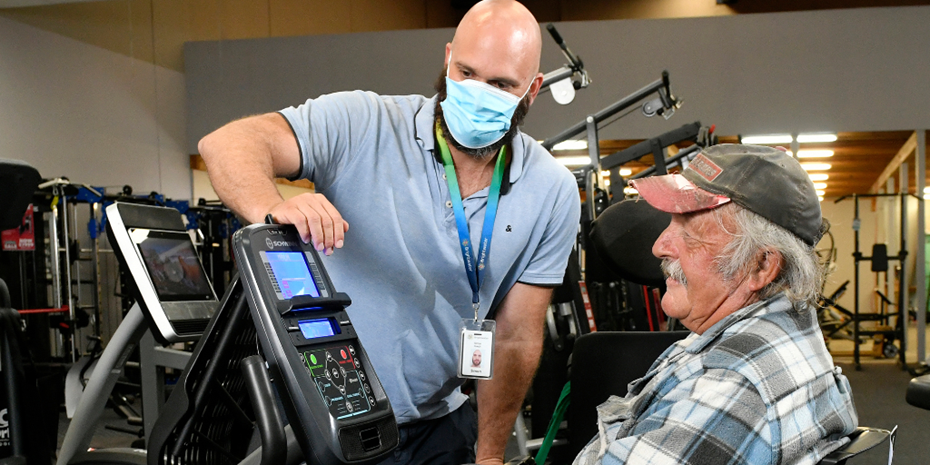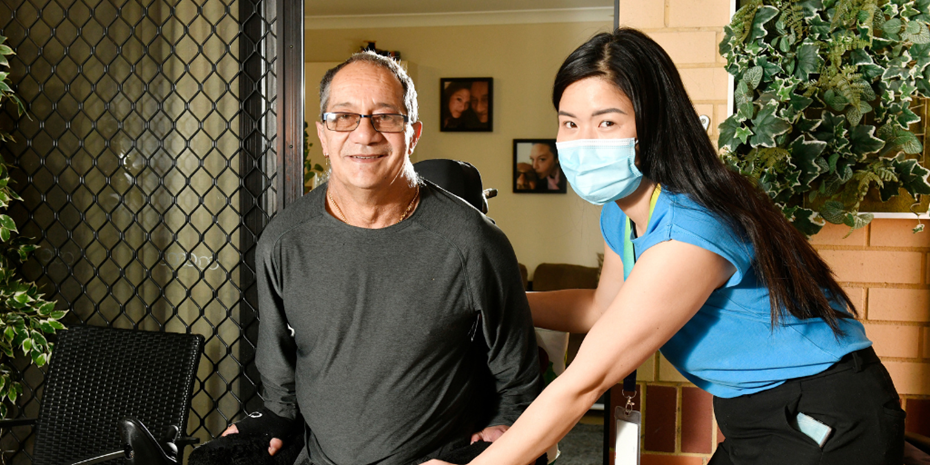
Twelve years ago, life was going well for Warrick McAuley. After moving to Perth from New Zealand in the 1990s, he’d become a specialist roof plumber, made great mates and was enjoying weekends surfing at some of Western Australia’s best beaches.
Then, says Warrick, pictured above with Physiotherapist Simon Grech, the unthinkable happened.
“I sat down to watch the rugby as New Zealand was playing, and I went to grab my toasted sandwich from the coffee table, when the next thing I know I’m on the floor thinking, what the heck is going on?” he says.
Warrick had suffered a stroke, something that affects more than 100 Australians every day.
He spent time in hospital and then at Brightwater’s Oats Street Rehabilitation Centre. When he was ready to leave Oats Street, Warrick knew he would need help as one side of his body had been left significantly weakened by the stroke.
That’s when he turned to Brightwater’s Capacity Building Program, which provides support to people with disabilities so they can maintain a level of independence and work towards their individual goals.
The team to build capacity
Brightwater’s Capacity Building Program supports clients with a range of services so they can improve their current abilities in everyday life or relearn lost abilities. The program is tailored to each person and flexible to meet changing needs.
Program Manager Sharidan Shimmin says Brightwater’s approach is unique because it operates on a team-based model rather than addressing client needs separately.
“Brightwater has always set itself apart by making sure we can provide client-driven outcomes for adults with highly complex needs,” he explains.
“We support clients with a range of services such as physiotherapy, occupational and speech therapy. We have social workers and dieticians, and we can even help with housing needs. It's rare that a company offers this.”
The team approach is valued by Capacity Building clients like Mathew Scaffidi (pictured below).
“I feel like they're there for me. They help me with what I want to do, like giving me the right exercises to achieve my goals,” he adds.
Mathew has a degenerative condition and, after a long time in a wheelchair, he was getting closer to his goal of standing and walking independently. Unfortunately, complications due to his condition meant that earlier this year, he had to have one leg amputated.
His team includes a Support Coordinator, Occupational Therapist, Therapy Assistant and Senior Physiotherapist. Together they’re helping him work towards his original goal.
“We work as a team to keep him able to live independently in his home, to be able to access the community to maintain his general wellbeing and independence,” Mathew’s Physiotherapist, Simon Grech says.
“It’s improving,” Matthew adds. “I've learnt how to transfer into my bed or into the car with the one leg. And I'm going to the pool every fortnight for exercises in the water. I've been so happy with them."
Sharidan adds: “We've got the best interests of our clients at heart, and we're really focused on how we can help them by working together.”
Complex needs, specialist care
The Capacity Building service includes some 40 health professionals with the depth of knowledge and skills to support people with highly complex needs to live a full life, at home and within the community.
The focus is very much on working alongside people who want to build their independence in their own way.
“So, we might visit them in their home but if that’s not a good environment for them or suitable, then we've got clinic-based services,” Sharidan says. “If they live in supported accommodation, we'll go and see them there. If they're in aged care, we'll see them there.”
Accessing the Capacity Building Program is not just for those with National Disability Insurance Scheme (NDIS) funding, even though they account for a large percentage of clients.
“Our clients can be an eligible participant of the National Disability Insurance Scheme, or they may have funding through the Insurance Commission of Western Australia,” Sharidan explains. "Or they may be fee for service and pay privately.
“Ultimately we are working within funding models that aim to help reduce the overall cost of care through developing skills to help clients live their best possible life.”
Former surf enthusiast Warrick knows what the best possible life looks like for him.
“To be able to walk down to the beach by myself and jump in the ocean. I haven’t been in the ocean for years and I love it,” he says.
Warrick is confident that the support of his Brightwater Capacity Building Team is giving him every chance of making it happen.



